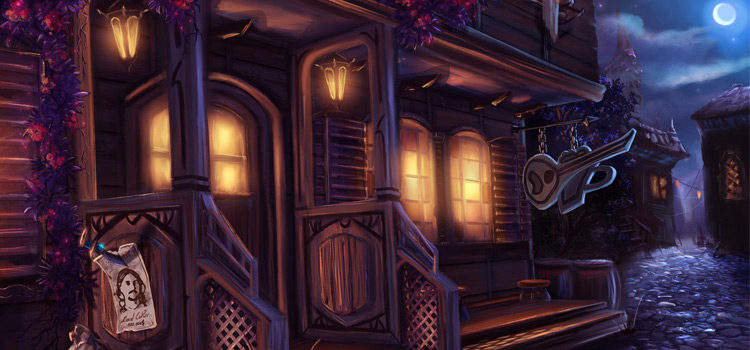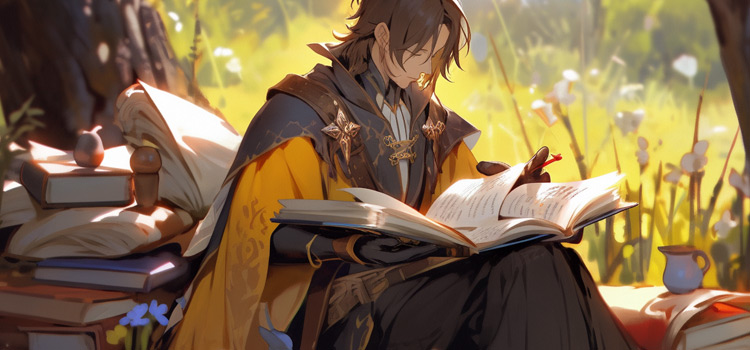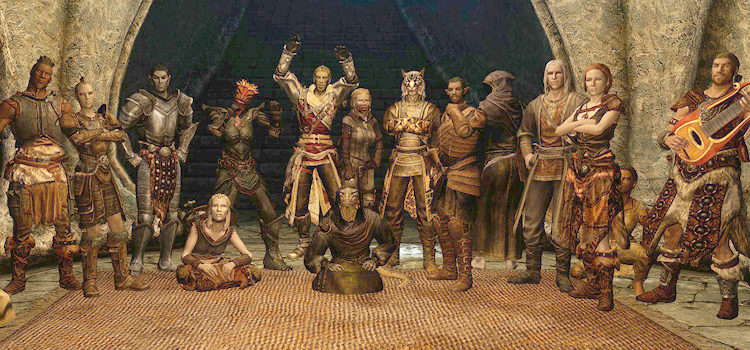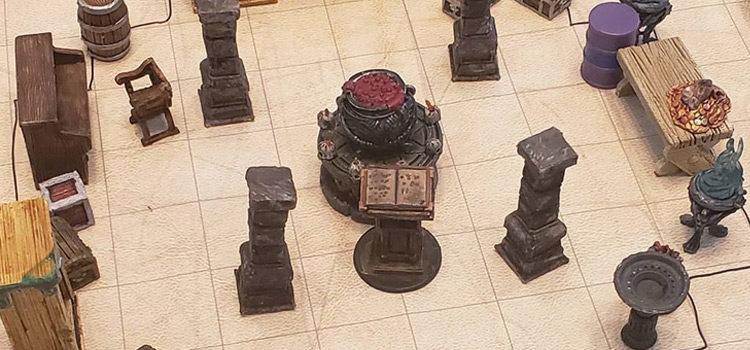What is a Bard College in 5e?
This post may contain affiliate links. If you buy something we may get a small commission at no extra cost to you. (Learn more).
Bardic Colleges aren’t colleges like we think of them: the pinnacles of higher understanding we’ve come to love.
No, they’re the Bard’s version of subclasses. A pledge you make to pursue a specific art, and one of the most divergent choices any class asks you to make when subclassing.
The ‘Colleges’ are more akin to loose bands of colleagues, drawing from the Latin word “colligent” meaning to gather, bind, or connect.
Never let it be said that D&D never taught you anything.
It’s a mindset. A dedication to the craft that binds you to your Bardic colleagues, and gives you the clarity to pursue further specialization in your bardic craft. A bit more vague and esoteric than would be expected, but perfect for the Bards.
Since bards are typically generalists, these subclasses can offer some much needed direction. But they are definitely not all created equal.
Which College Should I Go For?
There are, at the time of writing, nine Bardic Colleges to choose from.
Which I’ve roughly described and ranked here:
Underpowered
College of Creation (UA) – Speak life into your surroundings
College of Swords – Let your sword do the talking
Balanced
College of Satire (UA) – There’s a reason people are scared of clowns.
College of Valor – So you wanted to play a fighter
College of Lore – So you wanted to play a wizard
College of Eloquence – You really don’t like missing, do you
Transcendent
College of Spirits (UA) – Boo! *mass carnage ensues*
College of Glamour – Shakespear got something right
College of Whispers – Shapeshifters, Bodysnatchers and Wendigos oh my
I recommend picking one that piques your interest, and jumping down to my more in-depth analysis of the subclass.
I will be using the College of Valor and the College of Lore as my benchmark for the other subclasses. They are both very solid picks, with Lore making you more magically-inclined and Valor pushing you towards the more combat-heavy end of the spectrum.
They launched with the game, and can be easily molded into pretty much any character archetype you’re looking to play.
But first, let’s cover the Colleges that I don’t think are great choices, simply because they don’t add much to the Bardic gameplan, or they change the plan to the point that I think you’d be better suited switching classes all together (or multiclassing).
Underpowered Colleges
These can result in compelling builds, but are generally much more difficult to make work.
College of Creation:
This is a great example of a cool class concept, without any good abilities to back it up.
So much wasted potential, and in my opinion the only unviable Bard subclass.
Note of Potential (lvl 3): It gives Bardic Inspiration more uses, but in a worse way that almost any other subclass. Because Inspiration dice were meant to scale with your bonuses, and not your combat, all of the uses will be basically unusable in a few levels.
Animating Performance (lvl 6): This is the cool concept, a bard that speaks life into the world around them. Unfortunately, pets aren’t great in 5e, and this skill is terrible.
For one, the Creature you conjure is just terribly weak. And unlike familiars they don’t have the out of combat usefulness to make up for the lack of combat presence.
For another, the horribly short lifespan means you have to waste valuable time mid encounter to summon it.
Performance of Creation (lvl 14): Would be incredibly useful if they took away either the hard gold cap, or the incredibly short time span. Either would be a good limit, but both make the ability almost useless.
If this idea interests you, go Whisper, Glamour, or Lore, and pick up the spell ‘Animate Objects’.
College of Swords:
At this point I really don’t know why you’re playing a bard.
At least College of Valor can fight and cast the same turn, this subclass doesn’t have any abilities relating to being a bard.
If the idea of a charismatic swordslinger speaks to you, there are several Fighter archetypes to accomplish that. If you’re dead set on a Bard, try out the College of Valor, I guarantee it’ll play out better.
Now I feel that you should rarely, if ever, take these subclasses above. They simply don’t offer enough to a stereotypically underpowered class.
Fortunately, pretty much every other subclass is phenomenal and can be easily incorporated into an interesting, powerful build.
Balanced Colleges
There are two Colleges I consider to be at about the same level as Lore/Valor.
That is to say, they are well balanced and help bards do what bards do.
College of Satire:
You get to play as a Jester, tumbling and trouble rousing your way into the secret affairs of the high court.
This Subclass doesn’t give you much in the way of bardic abilities. But it makes you much harder to kill, and it’s abilities are somewhat useful. So it just barely clears the bar to land as a balanced class.
Still, I feel it’s on the weaker end of the subclasses.
Bonus Proficiencies (lvl 3): You always want someone in the party who can slip in and out of trouble, so a bard with sleight of hand and thieves tools makes sense.
Tumbling Fool (lvl 3): This is very much in line with the other level 3 ability, it’s geared mostly around making sure you can get out of the trouble you create seamlessly.
Failing that, it makes sure you can get out without taking significant damage.
Fool’s Insight (lvl 6): I think this ability is the subclass’ saving grace. Specifically because Detect Thoughts is such a useful ability, and being able to use it without expending a bards limited spell slots gives much greater use/precision to the class.
Fool’s Luck (lvl 14): This is essentially a worse version of the College of Lore’s ability to inspire themselves, but it will still definitely come in handy.
Plus, it leaves the gates open for some great interactive comedy. Which I feel more abilities could stand to do.
Nothing wrong with a fun interpretation, even if it is a little bit suboptimal.
College of Eloquence:
This College focuses mostly on making best use of your Inspiration dice, with most of its abilities being geared towards giving you more rolls for each die you expend.
It’s another heavily open ended subclass, and can be interpreted in any number of ways.
Silver Tongue (lvl 3): This makes sure that you never roll too low when talking your way out of trouble, and is a scaled down passive version of the spell Glibness, an incredibly potent 8th level spell.
That is to say, it’s very good.
Unsettling Words (lvl 3): As if that wasn’t enough for level 3, you can also make passing saving throws (like detecting if you’re being lied to) much more difficult for those you would be, hypothetically, lying to.
I think this phenomenal combination, and the resulting effect is the incredible ability to boldly lie your way out of almost any situation.
That being said, you can’t convince someone differently if they believe something to be a solid fact, no matter how good your roll.
The DM has the final say. So they will be the big determinant of how good this class ends up being.
Unfailing Inspiration (lvl 6): This is the central ability of the party, and makes sure all of your Inspiration dice go to use.
Universal Speech (lvl 6): One of the biggest holes in a persuasion based game plan is someone who doesn’t speak your language; this resolves that issue without needing a spell slot.
Infectious Inspiration (lvl 14): This is the closest thing the bard class gets to a mass inspiration in RAW 5e, and can be incredibly useful.
The name of the game for the College of Eloquence is consistency. It gives you multiple small boosts to make sure your bard skills and abilities never go unused.
That being said, there’s no great ability that elevates either of these subclasses. So both fall short of these next few that really show off the peak of what bards can do.
Transcendent Colleges
College of Glamour:
This is the path to take if you’re planning to multiclass a few levels into bard. And it’s a really interesting subclass idea that dives heavily into the Fey realm, and would mesh really well with Fey Druids or Wild Magic Sorcerers.
Mantle of Inspiration (lvl 3): One of the best low level panic options in the game that I can guarantee will come in handy.
The ability to flee without causing attacks of opportunity cannot be neglected, and it makes retreating a viable option.
This means you gain access to everything great about the bard class, the inspiration and expertise, and gain a campaign saving ability that will last you through the many levels to come.
Enthralling Performance (lvl 3): Though not the best Bardic Charm ability, it still gets the job done. The ability to essentially control an NPC’s actions, and then leave that scenario with that NPC still having a positive opinion of you. It’s pretty good.
Mantle of Majesty (lvl 6): This takes Enthralling Performance and turns it from ‘essentially control’ to ‘completely dominate’.
Plus if you charm the NPC first, they don’t become hostile after being controlled. Which fixes one of the biggest drawbacks of casting Command.
I cannot overstate how often this ability comes in handy.
Bards have always felt like a support class, and this ability elevates that by taking what is already a great situational ability and giving it the mechanical power to dissuade would-be attackers and dominate adversaries.
Unbreakable Majesty (lvl 14): This is the first average ability for the College of Glamour, simply because checks where you’re not the one rolling have an unfortunate tendency to not go your way.
5e has a lot of numbers to add to your rolls. So it doesn’t take a phenomenal roll to overcome a bard’s DC. That being said, it’s still a great ability for making sure an otherwise scrawny class can brave the frontlines where they’d be needed.
All in all, I think College of Glamour is one of the best subclasses for any class, period.
It takes the Bard gameplan in a new, interesting direction (playing more like a full support) and it does so in an incredibly potent way.
I think much of the power of this subclass is gained at level 6, so if you’re planning to multiclass into bard, bard 3 and bard 6 are both great choices.
College of Spirits:
I am probably too partial to luck based classes, but I feel the inconsistency can be a great way to nerf otherwise oppressive abilities.
The College of Spirits takes this ideology and runs with it. You’ll see what I mean when you get to the ‘Tales from Beyond’ section.
Guiding Whispers/Spiritual Focus (lvl 3): These are really cool flavor touches, even if they don’t give too much in the way of actual abilities.
Tales from Beyond (lvl 3): This is the class’ signature ability, and involves randomly picking a story to recount for the day.
The stories can do everything from granting extra attacks and temporary hit points to bestowing invisibility and extra necrotic damage on a hit.
About half are meaningful buffs, and half are severe debuffs. And both can be applied to friend and foe alike.
I really like the idea of a roll determining how you’ll be playing for the day. And it’s backed up by some truly incredible flavor text.
The first thing that comes to mind is the schizophrenic bard stumbling from encounter to encounter, motivated to rid himself of the voices in his head until he slowly comes to rely on their help. I’m just totally in love with this subclass.
Spirit Session (lvl 6): Any ability that allows you to learn new spells is great by my book, even if it’s temporary.
Cast into an orb of holding, or something similar, and you have a seriously powerful & more consistent tool.
Mystical Connection (lvl 14): If used it makes the likelihood of getting buffs from the Tales from Beyond ability much higher, and saves you a bardic inspiration die.
I don’t talk about this subclass much. But I feel that this really speaks for itself.
You can tell that this was someone’s homebrewed brainchild that they spent months perfecting, it’s incredibly charming.
College of Whispers:
Finally, my pick for the best Bard subclass.
I think that College of Spirits is a more powerful class mechanically. But I feel that it’s expressly limited by the fact it can only be played by one specific character type.
The College of Whispers is a bit more broad. For every corrupt politician, wizened court vizier, and manipulative noble making a push for power.
The subclass implements the traits that would be utilized by those ambitious parties with a terrifying accuracy.
Psychic Blades (lvl 3): Honestly, this was probably included because Wizards of the Coast felt the class would be underpowered. But it’s just really icing on the cake, giving you a scaling, resistance piercing assassination tool.
Words of Terror (lvl 3): This is very much similar to the College of Glamour in that having a creature directly under your control is way too potent of an ability.
It’s a little bit worse than Glamour’s, but it gets much better with some of the later abilities.
Mantle of Whispers (lvl 6): This is the subclass’ best ability. And though there are other ways to accomplish a similar goal, I feel that Mantle of Whispers is so deeply entrenched in the subclass’ ideology of betrayal and manipulation, that it matches the tone perfectly.
The relatively easy access to a dead person’s information is very good. But a lot of my enjoyment with the subclass comes from the layers of intrigue this can have at your table.
Mantle of Whispers is the jumping off point. But the disguise can be maintained with other spells. I think it’s an incredibly fascinating idea to have a Neutral Evil character masquerading as some kings knight or court wizard, until ten sessions into the campaign when the façade starts falling apart.
Seems like such a creative, versatile ability that lends itself incredibly well to the meta-gameplay of the bard. And it’s hard to imagine a build suffering because of this.
Really, it’s the perfect example of an additive ability that doesn’t impede what a bard would want to do.
Shadow Lore (lvl 14): This is the ability that elevates Words of Terror, and honestly it just adds to the layers of control and deception this class can have.
Final Note: All Colleges Are Worth Playing
Now you may disagree with the placements on this list, and that’s completely fine. Anything in the ‘Balanced’ tier or higher I consider completely feasible to make into a viable character.
Plus I heavily prioritized subclasses that diversified what a Bard character could look like over mechanical superiority.
That means that some very good (and very interesting) subclasses got the short end here for no good reason other than they didn’t pique my interest.
However, don’t let yourself be capped by my imagination.
If you have an interesting idea for one of these subclasses, then I highly encourage running with it.
Bards can be some of the most fun you’ll ever have at the table. And it feels very anti-Bard to run with a subclass because of what some list told you.
Embrace the chaos and have some fun.






